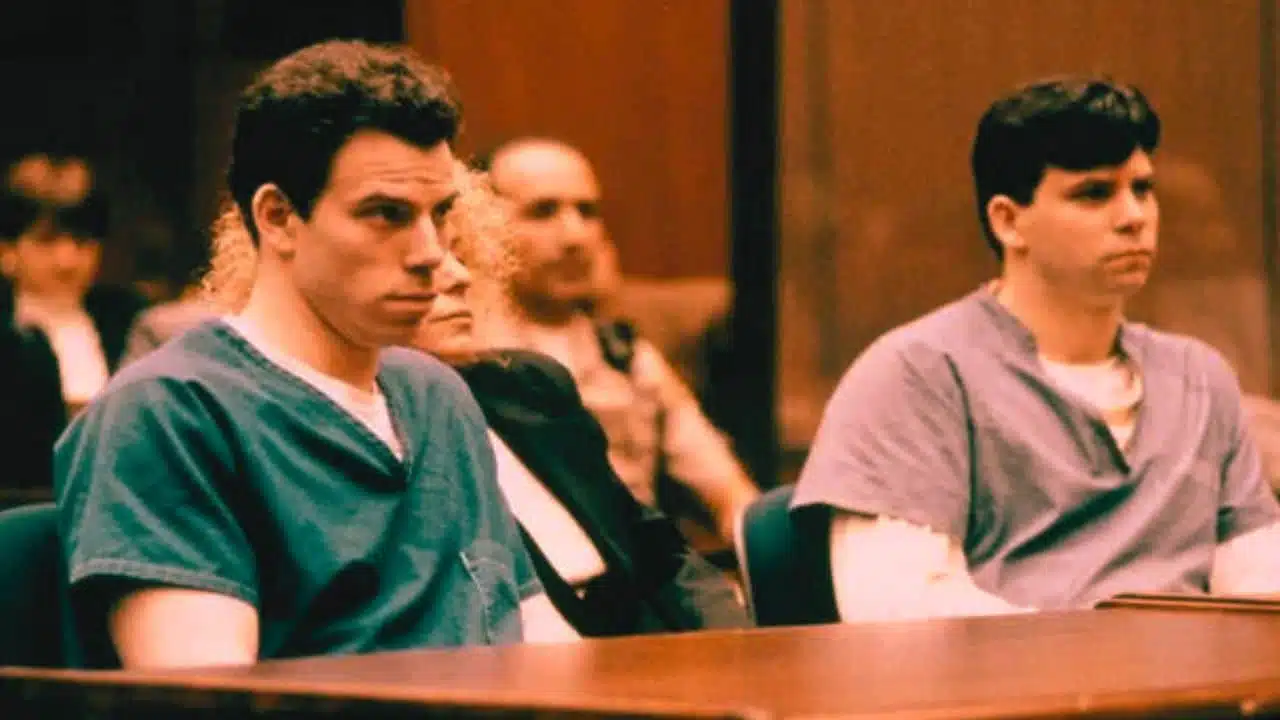Erik and Lyle Menendez, the infamous brothers convicted of killing their parents over 30 years ago, may be closer than ever to the possibility of release. Currently serving life sentences without parole in California, the brothers face a potential shift in their fate. The Los Angeles County District Attorney’s Office, led by George Gascón, has recently recommended their resentencing, arguing for a reduced sentence that could allow for parole eligibility. This development, while a significant step, is only the beginning of a potentially lengthy and contentious journey.
For years, the Menendez case has fascinated the American public, both for its shocking brutality and the complex narratives surrounding the motives behind the murders. With the potential for parole on the horizon, it raises both renewed interest and deep-seated debate among legal experts, family members, and the general public.
Details of the Resentencing Request: A Glimpse into Decades Behind Bars
On Friday, a comprehensive 57-page motion filed by the Los Angeles District Attorney’s Office laid out the reasoning behind the call for resentencing, presenting a strong case based on the brothers’ actions and conduct during their time in prison. The document provides insights not only into the Menendez brothers’ legal case but also into their lives behind bars, highlighting their achievements, rehabilitation efforts, and personal growth.
Since their incarceration, both brothers have completed educational degrees, contributed to prison programs designed to aid fellow inmates, and participated in initiatives aimed at supporting vulnerable groups, such as inmates with a history of childhood trauma and elderly or disabled individuals. According to the motion, these efforts were made “without any expectation or hope of ever being released,” illustrating what the district attorney’s office describes as a genuine commitment to rehabilitation.
The motion further includes the brothers’ disciplinary records spanning over 30 years. Both brothers have relatively few infractions for such long sentences; they were cited once for possessing a mobile phone in their shared cell. Erik’s record includes additional citations: two altercations that took place in 1997 and 2011. Lyle, on the other hand, was transferred to a “special needs” unit in 1997 due to his refusal to fight back during attacks by other inmates. His only infractions are for minor contraband items—a lighter in 2013 and Adidas sneakers gifted by a visitor in 1998.
The filing describes the brothers’ evolution as significant, noting that they “have transformed and taken advantage of meaningful opportunities to mature, move beyond criminal thinking, repent, and become productive community members.” The district attorney’s office asserts that Erik and Lyle Menendez are “ready to reenter society” if given the chance.
What Happens Next? Steps Toward Resentencing
This motion is a foundational step in the process that could eventually lead to the Menendez brothers’ release. The Los Angeles County District Attorney’s Office will present its argument before a judge in a resentencing hearing, advocating for the brothers to be re-sentenced to terms that make them immediately eligible for parole. California law allows for reduced sentences based on various factors, including the age of the individuals at the time of the crime, and the district attorney argues that these considerations apply to the Menendez case.
The hearing is expected to take place within the next 30 to 45 days. During this proceeding, both proponents and opponents of the resentencing will present their arguments, and the hearing promises to be a heated one. Although District Attorney George Gascón and his office support the resentencing, some members of his team are expected to oppose it in court, highlighting the internal divisions within the office on this case.
If the judge rules in favor of resentencing, the case will be handed to the California parole board, which will assess whether the Menendez brothers are fit to rejoin society. The parole board will consider a variety of factors, including the nature of their crime, their behavior in prison, and whether they pose any risk to the public if released.
Yet, even if the parole board recommends release, there remains one more critical step. Governor Gavin Newsom has the authority to review and potentially halt any parole proceedings, making his stance a crucial factor in the brothers’ potential freedom.
Family Perspectives: Division and Trauma Within the Menendez Clan
The possibility of release has sparked a divide within the Menendez family. Earlier this month, more than two dozen relatives publicly advocated for the brothers’ release, voicing their support in light of alleged abuse they say Erik and Lyle endured at the hands of their father, Jose Menendez. They argue that the abuse mitigates the severity of the crime, suggesting that the brothers may have acted out of desperation rather than cold-blooded intent. Joan Anderson VanderMolen, Kitty Menendez’s sister, expressed her belief that today’s societal awareness of abuse would make juries more sympathetic to the brothers’ situation, stating, “A jury today would never deliver such a harsh sentence.”
However, this view is far from unanimous. Milton Andersen, Kitty’s brother, maintains that the brothers should remain behind bars for what he describes as an unforgivable act of violence. Through his attorney, Andersen called Erik and Lyle “cold-blooded” killers whose actions inflicted irreversible trauma on the family. His lawyer, Kathy Cady, emphasized the brutality of the murders, noting that Jose Menendez was shot six times, while Kitty was shot ten times, including a final shot to her face after Erik paused to reload his weapon. Andersen’s stance is clear: the brothers’ crime was heinous, and he believes they should continue serving their sentences.
Media Influence and Public Support: How a Case From the ’90s Stays Relevant
In recent years, the Menendez case has seen a resurgence in public interest, partly due to media portrayals that re-examined their story. The Netflix drama Monsters: The Lyle and Erik Menendez Story and the docuseries The Menendez Brothers have sparked a new wave of attention on the case, introducing it to younger audiences who were not alive or aware during the original trials. With figures like Kim Kardashian and Rosie O’Donnell publicly supporting their release, the case has gained both social media traction and renewed scrutiny.
This public support and media exposure are significant. Attorney Neama Rahmani, a former federal prosecutor, described the situation as a “perfect storm of PR and politics,” noting that high-profile endorsements and Hollywood portrayals have created a unique opportunity for the Menendez brothers. Rahmani also highlighted that Gascón’s decision to push for resentencing comes during a tight re-election race, raising questions about potential political motivations. While Gascón denies that his recommendation is political, he acknowledges that his office has reviewed the case for over a year and made the decision public only after careful deliberation.
Why Did the Menendez Brothers Kill Their Parents? Revisiting the Motive
Central to the Menendez case is the question of why Erik and Lyle killed their parents. During their trials, the prosecution presented the brothers as spoiled, privileged young men who murdered Jose and Kitty Menendez to access their $14 million estate. Prosecutors described how the brothers had meticulously planned the crime, purchasing shotguns and shooting their parents as they watched TV in the family’s opulent Beverly Hills home. Evidence showed that after the murders, the brothers went on shopping sprees, buying Rolex watches and luxury items, attending parties, and even gambling—all actions that prosecutors argued underscored their alleged greed.
The defense painted a starkly different picture. Erik and Lyle admitted to the killings but claimed they acted in self-defense after years of suffering alleged abuse from their father, including emotional, physical, and sexual abuse. According to their testimony, they lived in constant fear of their father, believing that their lives were at risk. The brothers detailed events leading up to the murders, describing confrontations with their parents and their belief that Jose and Kitty planned to kill them.
Family members testified about witnessing various forms of abuse, although none could corroborate the allegations of sexual abuse directly. A pivotal moment in the case came when the brothers confessed to the murders during a therapy session with a psychologist. This confession was later leaked to authorities by the psychologist’s girlfriend, a factor that played a significant role in their eventual arrest.
Parole or Continued Incarceration?
The road to possible release for Erik and Lyle Menendez is far from straightforward. As public interest in the case continues, the resentencing recommendation adds a new layer to an already complex legal narrative. If the resentencing is granted, it will mark a notable shift in the justice system’s stance on high-profile cases involving allegations of abuse and mental trauma.
As the legal battle continues, the case poses larger questions about justice, rehabilitation, and societal perceptions of abuse. Regardless of the final outcome, the story of the Menendez brothers—and the family tragedy that defined their lives—continues to hold a significant place in the American consciousness.
The Information is Collected from MSN and Yahoo.


































